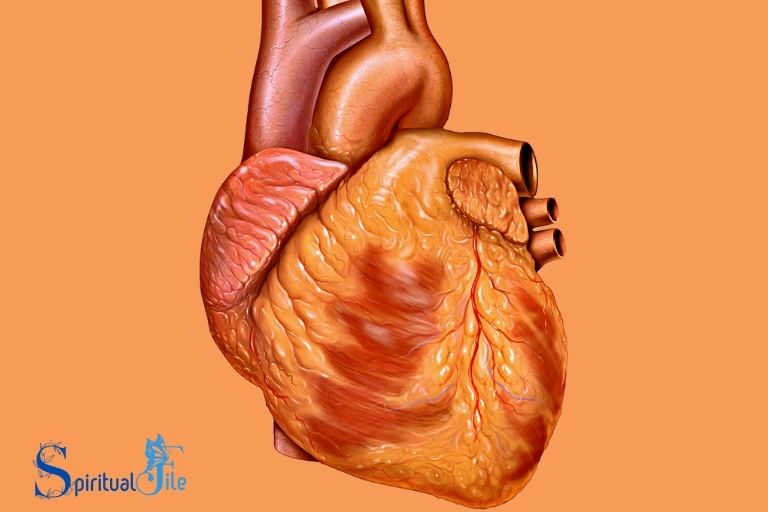What Does the Heart Represent Spiritually: Wisdom!
Spiritually, the heart represents love, compassion, wisdom, and the center of our emotions and soul.
In many spiritual and religious traditions, the heart is considered the core of our being, the seat of our emotions and the source of love.
It is a symbol of our connection to the divine and to one another, as well as a metaphor for the soul. The heart is also associated with wisdom, understanding, and spiritual growth.
Throughout history, the heart has been an important symbol in various cultures and belief systems.
From the sacred heart in Christianity, representing Jesus’ divine love for humanity, to the Anahata chakra in Hinduism and Buddhism, symbolizing balance and inner peace, the heart is a crucial aspect of spiritual practice.
By working to open and strengthen our hearts, we can deepen our connections to others and the divine, fostering a more compassionate, empathetic, and spiritually aware life.
8 Symbolic Significance of the Heart
| Symbolism | Spiritual Meaning |
|---|---|
| Love | Unconditional love, divine love, and love for oneself and others |
| Courage | Bravery and strength in the face of challenges and adversity |
| Compassion | Empathy and understanding for others’ suffering and experiences |
| Emotion | The center of emotional expression and connection with others |
| Life Force | The source of energy, vitality, and health |
| Wisdom | Inner guidance and intuition, as well as the ability to learn from life experiences |
| Balance | Harmony between mind, body, and spirit |
| Transformation | Personal growth and the ability to change and evolve spiritually |
Key Takeaway

Five Facts About: The Spiritual Meaning of the Heart
The Heart: A Universal Symbol Across Cultures And Religions
The heart has been utilized as a symbol in various cultures across the globe for centuries.
The heart is often interpreted as the source of love, affection, and compassion. It’s an essential aspect of our humanity and how we relate to others.
Historical Significance Of The Heart As A Symbol
The heart is one of history’s most common symbols, with roots dating back to ancient times.
Some of the earliest depictions of the heart came from the ancient egyptians, who associated the organ with life and rebirth.
Later, the greeks believed that the heart was the center of emotion, intellect, and the soul. Aristotle called the heart the “first principle” of life.
In the middle ages, the heart became an emblem of chivalry and romantic love. The heart symbol, often accompanied by a lock and key, was used to express deep, romantic devotion.
Heart Symbolism In Different Cultures And Religions
The use of the heart as a symbol is not exclusive to certain cultures or religions. Rather, it transcends all boundaries.
In eastern culture, the heart represents the center of being and is associated with the emotions and the mind. It’s also believed to be the seat of the soul.
In christianity, the heart is a symbol of god’s love. The sacred heart of jesus, a depiction of christ’s physical heart, is a crucial aspect of catholicism, representing christ’s undying love for humanity.
The jewish star of david contains a heart at its center, symbolizing the love of the jewish people for god.
The Heart As A Representation Of Emotions And Humanity
Finally, the heart as a symbol is often associated with emotions. It’s the place where we feel love, joy, and intense feelings of happiness or sorrow.
The heart is also a representation of our humanity. Many believe that it’s what makes us truly human, and without it, we would be unable to experience love, empathy, and other deeply felt emotions.
The heart remains a symbol of immense significance across cultures, religions, and eras. It represents the beauty and fragility of the human heart, the seat of our emotions and the essence of our humanity.
The Spiritual Significance Of The Heart In Religion
The heart is more than just an essential organ that pumps blood throughout the human body; it’s also a powerful symbol that represents many things in various cultures, including spirituality.
The heart is believed to represent the center of emotions, and it’s no wonder it holds a special place in many religions.
In this blog post, we’ll delve into the spiritual significance of the heart in different religions, including its symbolism, practices, and connection to attaining spiritual enlightenment.
The Heart As A Symbol Of Love, Compassion, And Kindness In Religious Texts
Religious texts from different cultures often use the heart as a symbol of love, compassion, and kindness.
Here are some key points that illustrate the heart’s spiritual significance in religious texts:
- In christianity, the concept of the sacred heart of jesus represents his divine love for humanity.
- The book of psalms in judaism refers to the heart as a place where god resides, and it’s where prayer and meditation take place.
- In hinduism, the heart chakra, also known as anahata, is believed to represent the center of compassion and love.
Heart-Centered Spiritual Practices Across Various Religions
Spiritual practices that focus on the heart center are also prevalent in different religions.
Here are some brief explanations of these practices across different cultures:
- In christianity, the practice of the rosary includes meditating on the “mysteries” of jesus’ life, death, and resurrection. It involves reciting prayers such as the hail mary while contemplating the heart of jesus and mary.
- In buddhism, the practice of loving-kindness (metta) involves cultivating feelings of goodwill and kindness towards oneself, loved ones, and even enemies. It’s believed that this practice helps open the heart and develop qualities such as empathy and compassion.
- In islam, the practice of dua is a form of supplication where one asks for guidance, forgiveness, or blessings from allah. The practice often involves placing one’s hand on the heart as a sign of devotion and sincerity.
Significance Of The Heart In Achieving Spiritual Enlightenment
Finally, the heart holds great significance in achieving spiritual enlightenment across different religions.
Here are some brief points explaining why:
- In hinduism, the heart chakra is where the divine consciousness resides, serving as a center for spiritual transformation and self-awareness.
- In buddhism, the “heart-mind” is where one can experience the true nature of reality and attain enlightenment.
- In christianity, the sacred heart represents the ultimate expression of love for humanity and serves as the path to salvation.
The heart holds significant spiritual meaning in many religions. Whether it’s through symbolism, practices, or the attainment of spiritual enlightenment, the heart remains a potent symbol that represents love, compassion, and kindness.
The Heart Chakra: Understanding The Spiritual Connection
The heart chakra is the fourth chakra in the seven chakra system. It is located at the center of our chest and is associated with the color green.
This chakra is the center of love, compassion, and connection. Understanding the spiritual significance of the heart chakra can help us establish a deeper connection with ourselves and others.
Overview Of The Chakra System And The Heart Chakra
- The chakra system is an ancient system of energy centers in the body. There are seven chakras in total.
- Each chakra has a specific location, color, and spiritual significance.
- The heart chakra is the fourth chakra and is associated with the color green. It is located at the center of our chest.
- The heart chakra represents love, compassion, and connection.
The Spiritual Significance Of The Heart Chakra
- The heart chakra is the center of love and compassion. It connects us to our true selves and to others.
- A balanced heart chakra allows us to give and receive love freely and without attachment.
- When the heart chakra is blocked, we may experience feelings of loneliness, isolation, and fear of rejection.
- An overactive heart chakra may lead to codependency and an inability to establish healthy boundaries.
How To Activate And Balance The Heart Chakra
- Meditation and visualization can be instrumental in activating and balancing the heart chakra.
- Practice loving-kindness meditation to cultivate feelings of love and compassion towards yourself and others.
- Surround yourself with the color green, eat green foods, or spend time in nature to promote balance in the heart chakra.
- Practice heart-opening yoga poses like camel pose or bridge pose to open the chest and activate the heart chakra.
The Connection Between The Heart Chakra And Emotional Healing
- The heart chakra is closely connected to emotional healing.
- When the heart chakra is blocked, it can create emotional wounds that manifest in our relationships and life experiences.
- By working to balance and activate the heart chakra, we can heal emotional wounds and improve our relationships with ourselves and others.
- The heart chakra allows us to approach situations with love and compassion, promoting emotional healing and personal growth.
Understanding the spiritual significance of the heart chakra can help us establish a deeper connection with ourselves and others.
By practicing meditation, visualization, and yoga, we can activate and balance the heart chakra and promote emotional healing and personal growth.
The Heart And Mind Connection: Balancing Thoughts And Emotions
Understanding The Relationship Between The Heart And The Mind
The spiritual representation of the heart is often associated with love, compassion, and emotional intelligence. Meanwhile, the mind is linked to logic, analytical thinking, and rationality.
Yet, these two seemingly contrasting aspects of our being are not separate from each other; instead, they share a strong connection.
The heart and mind connection is essential to maintain a balanced and peaceful life.
- Our mind is responsible for processing our thoughts and emotions, and the heart serves as a filter for these thoughts.
- When our heart is open and accepting, it allows love and positivity to flow through our bodies, enabling us to have a more spiritual outlook on life.
- On the other hand, negative emotions such as fear and anxiety could limit the heart’s capacity to receive love and compassion, resulting in an imbalanced emotional state.
How Meditation And Mindfulness Can Help Balance The Heart And Mind
Meditation and mindfulness practices teach us how to stay present and focused on the present moment.
These techniques help us achieve a balanced emotional state by bridging the gap between our heart and mind.
- Meditation provides us with a safe space to observe our thoughts and emotions and helps us establish a deeper connection with our spiritual selves.
- Practicing mindfulness heightens our awareness of our inner selves, allowing us to become more compassionate towards ourselves and others.
- By investing time and effort in mindfulness and meditation, we can learn how to stay grounded and centered, which will significantly benefit our emotional and spiritual growth.
Importance Of Cultivating Emotional Intelligence For Spiritual Growth
Emotional intelligence refers to one’s ability to recognize, understand, and manage their emotions while empathizing with others.
A high level of emotional intelligence is essential for personal transformation and spiritual growth.
- Cultivating emotional intelligence allows us to gain a deeper insight into our emotional state, improving our decision-making processes.
- Developing emotional intelligence also enables us to regulate our emotional responses to negative situations, resulting in a more centered and balanced life.
- Understanding and empathizing with others is a crucial aspect of emotional intelligence. By doing so, we can build stronger relationships and become more compassionate human beings.
Maintaining a balanced heart and mind connection by practicing meditation, mindfulness and emotional intelligence is essential for our spiritual growth.
By embracing these practices, we can achieve a peaceful and fulfilling life journey.
The Heart And Spiritual Transformation: Discovering Self-Love And Higher Purpose
The heart has long been regarded as the center of emotions, but in spirituality, it symbolizes so much more.
The heart represents the core of one’s being, the place where the physical and spiritual worlds merge.
When we are in tune with our hearts, we can tap into our intuition and guide ourselves towards a more fulfilling life path.
In this post, we will explore the importance of self-love and self-compassion in spiritual growth, how the heart can act as a compass for finding one’s purpose, heart-based practices for pursuing a spiritual path, and the connection between the heart and manifesting one’s desires.
Importance Of Self-Love And Self-Compassion In Spiritual Growth
Self-love and self-compassion are essential components in spiritual growth. It’s challenging to reach a higher level of consciousness if we don’t first learn to love and accept ourselves.
Our perceptions of the world are often shaped by our beliefs about ourselves.
When we have self-esteem, compassion, and love, it changes how we interact with the world and the people around us.
Here are some key things to remember about self-love and self-compassion for spiritual growth:
- Cultivate non-judgmental awareness of your thoughts and feelings. Don’t judge yourself for what comes up.
- Practice self-care. Take care of your physical body through exercise, healthy eating, and getting enough sleep.
- Set healthy boundaries. Learn to say ‘no’ when it’s necessary.
- Work on forgiving yourself for your mistakes and accept yourself for who you are.
The Heart As A Compass For Finding One’S Purpose
Using the heart as a compass for finding your purpose is about connecting to your intuition and inner wisdom.
It’s about following the path that resonates with you authentically. When you are connected to your heart, you can more easily differentiate between what you “should” do and what you genuinely want to do.
Here are some practical steps to take to use the heart as a compass:
- Spend time in stillness and listen to your heart’s inner voice.
- Trust yourself and trust your intuition.
- Pay attention to the signs and synchronicities that appear in your life. They are pointing you towards your purpose.
- Don’t be afraid to take risks and try new things. It’s better to try and fail than never to try at all.
Heart-Based Practices For Pursuing A Spiritual Path
Practicing heart-based approaches to spirituality is all about cultivating qualities like love, compassion, kindness, forgiveness, and joy.
By focusing on these qualities, we can live with greater happiness, peace, and harmony.
Here are some practical heart-based practices to consider:
- Practice mindfulness and present-moment awareness.
- Incorporate gratitude into your daily routine.
- Practice acts of kindness and service.
- Dedicate time to meditation and stillness.
The Connection Between The Heart And Manifesting One’S Desires
The heart’s energy is powerful, and it can lead us to manifest our deepest desires. When we connect to our hearts, we are tapping into the unlimited potential of the universe.
By aligning our deepest desires with our heart’s energy, we can start to manifest them.
Here are some things to keep in mind:
- Set an intention aligned with your heart’s desire.
- Visualize your desired outcome, imagining how it would make you feel.
- Take inspired action towards your goal.
- Trust that the universe will support you in manifesting your deepest desires.
Are the spiritual meanings of the heart and the eye connected in any way?
The spiritual meanings of the heart and the eye are deeply connected. In many belief systems, the heart represents love, compassion, and emotional well-being, while the eye’s spiritual representation and enlightenment symbolize vision, intuition, and inner wisdom. Together, they signify the interconnectedness of emotion, perception, and spiritual insight.
FAQ About What Does The Heart Represent Spiritually
What Is The Spiritual Significance Of The Heart?
The heart is believed to signify love, emotion, and commitment’s spiritual facet. It’s the core of a human being’s emotional and spiritual self.
How Does The Heart Connect To The Divine?
The heart is recognised as the centre of the soul. A loving heart aids in developing a deeper connection with the divine and serves as a bridge between the physical and the spiritual worlds.
Can The Heart Chakra Block Our Spiritual Growth?
Yes, a blocked heart chakra can stifle our spiritual development. Negativity, fear, and pain can all inhibit energy flow through the heart chakra, resulting in spiritual stagnation or regression.
How Can Heart-Focused Meditation Enhance Our Lives?
Heart-focused meditation can help us develop a greater understanding of our emotions, our connection to others, and our spiritual core. It assists in aligning our physical, emotional, and spiritual selves.
Can Unlocking Your Heart Chakra Bring Joy And Inner Peace?
Unlocking your heart chakra can bring peace, positivity, and love into your life. One can develop a deeper connection with their emotions, feel more self-aware, and have a more profound sense of empathy and compassion.
Conclusion
The heart is more than just a physical organ, it is a symbol of compassion, love, and spirituality.
Many cultures and religions view the heart as the center of the human soul and believe that by cultivating a pure heart, one can achieve a higher state of spiritual consciousness.
Throughout history, the heart has been used to represent the essence of humanity and has been used in various art forms and literature to convey powerful emotional messages.
So, what does the heart represent spiritually? It represents the connection between the human and the divine, and reminds us of the importance of love and compassion in our lives.
By living from the heart, we can cultivate a deep sense of inner peace, harmony, and gratitude. May we all strive to live from the heart and experience the true beauty of the spiritual journey.





